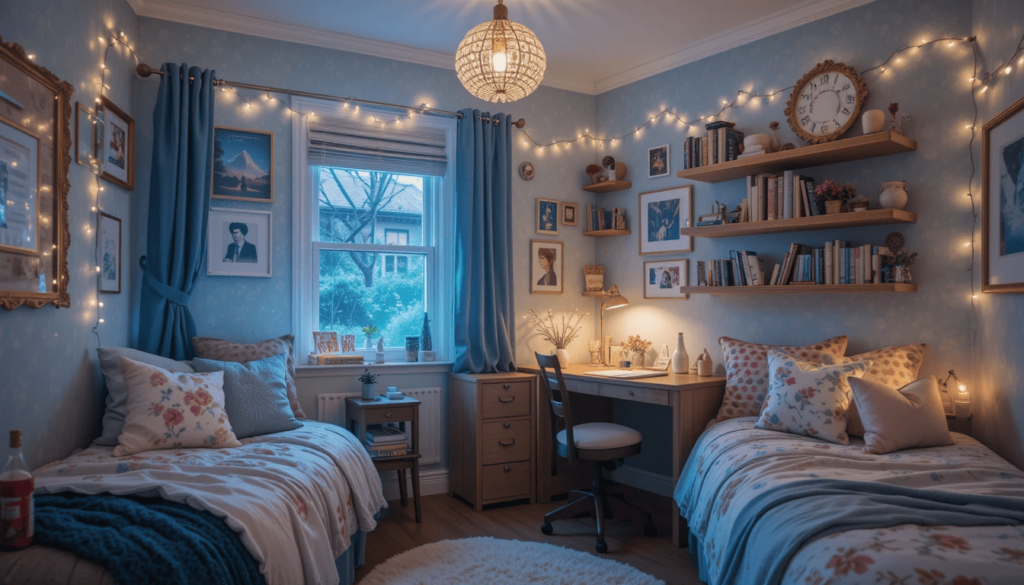Sharing a room doesn’t mean sacrificing your personal space. If you’re wondering how to create private space in a shared bedroom, you’re in the right place! From budget-friendly solutions to creative setups, this guide will help you carve out your own sanctuary, no matter the size of the room.

Introduction to Shared Bedroom Privacy Challenges
Privacy in shared bedrooms can feel like an elusive goal, especially when space is tight or schedules clash. But understanding how to create private space in a shared bedroom begins with recognizing the importance of personal boundaries and creating a plan that works for everyone involved.
Creative Ways to Divide a Shared Bedroom
One of the simplest ways to tackle how to create private space in a shared bedroom is by introducing room dividers or screens. These versatile tools not only add privacy but can also enhance the room’s overall aesthetic.
“A little personal space can work wonders for your mental health and relationships. It’s not selfish—it’s necessary.”
Benefits of Creating Personal Space in Shared Bedrooms
When you create a private zone in a shared room, you enhance not just your comfort but also your overall quality of life. It allows you to focus better, sleep soundly, and maintain harmonious relationships with your roommates.
Assessing Your Shared Bedroom Layout
Before you start setting up your private space, take a moment to evaluate your room’s layout.
Evaluating Available Space
Is the room large or compact? Do you have furniture that can be rearranged to create divisions? By assessing the available space, you can plan more effectively.
Identifying Potential Privacy Zones
Corners, behind furniture, or even elevated spaces like loft beds can serve as excellent privacy zones. Look for areas that naturally lend themselves to separation.
Considering Furniture and Roommate Preferences
Collaborate with your roommates before making any big changes. They might have ideas you hadn’t considered, and mutual agreement helps avoid conflicts.
Creative Ways to Divide a Shared Bedroom
A little creativity goes a long way when dividing a shared bedroom. Let’s explore some clever solutions.
Using Room Dividers and Screens
Room dividers and screens are one of the simplest ways to create a private space. They’re versatile, stylish, and easy to install.
Types of Room Dividers: Portable, Folding, and Curtain-Based
- Portable Dividers: Lightweight and easy to move around.
- Folding Screens: Offer flexibility and can double as decor.
- Curtain-Based Dividers: Ideal for those who want a softer, more affordable solution.
Furniture Placement for Natural Separation
Strategically placing furniture like bookshelves or cabinets can create an organic division.
Utilizing Bookshelves and Cabinets as Dividers
A tall bookshelf not only separates spaces but also offers storage. Double-sided shelves can be especially practical.
Personalizing Your Private Space
Your private space should reflect your personality. It’s all about making the area feel like home.
Choosing Personalized Decor and Accessories
Add cushions, rugs, or artwork that resonate with you. A splash of your favorite color can make all the difference.
Adding Lighting for Ambience and Privacy
Use table lamps, fairy lights, or dimmable LEDs to create a cozy atmosphere. Lighting can also visually separate spaces.
“Good lighting isn’t just about aesthetics—it’s a mood booster.”
Noise Reduction Tips: Headphones and Soundproofing
Invest in noise-canceling headphones or simple soundproofing solutions like foam panels to minimize disturbances.
Tackling Common Challenges in Shared Spaces
Shared spaces come with hurdles, but there are ways to overcome them.
Balancing Shared and Personal Space Needs
Find a balance between using shared areas and maintaining your personal zone. Open communication is key.
Managing Privacy in Small Bedrooms
For compact rooms, consider multi-functional furniture like a loft bed with a privacy curtain.
Addressing Conflicts Over Privacy with Roommates
Disagreements happen, but respectful conversations can resolve most issues. Agree on boundaries and stick to them.
Affordable Privacy Solutions on a Budget
Privacy doesn’t have to break the bank.
Repurposing Everyday Items for Privacy
Use items like tension rods and shower curtains to create simple dividers.
Shopping Smart for Inexpensive Privacy Aids
Stores like IKEA and online platforms offer affordable options for room dividers and decor.
Long-Term Privacy Solutions
If you’re looking for a more permanent fix, consider these ideas.
Investing in Modular Furniture
Modular furniture adapts to your needs, making it a smart choice for shared bedrooms.
Redesigning Shared Spaces for Better Privacy
Consider a full redesign of the room layout to maximize privacy for all occupants.
Benefits of a Well-Designed Private Space
A well-thought-out private space can significantly impact your life.
Enhancing Mental Health and Focus
Having a personal retreat reduces stress and improves concentration.
Improving Relationships in Shared Bedrooms
When everyone respects each other’s space, relationships flourish.
FAQs: Addressing Common Concerns
What if My Roommate Disagrees with My Privacy Setup?
Communicate your needs and find a compromise that works for both parties.
How Can I Create Privacy in a Tiny Shared Bedroom?
Focus on vertical space and use curtains or canopies to define your area.
Are There Portable Solutions for Temporary Privacy?
Yes, folding screens and portable dividers are great for temporary setups.
Conclusion: Finding Balance in Shared Spaces
Creating private space in a shared bedroom is all about finding a balance between your needs and those of your roommates. With a little creativity and communication, you can turn even the smallest room into a sanctuary that works for everyone.
“Privacy isn’t about isolation; it’s about creating a haven where you can recharge and be your best self.”